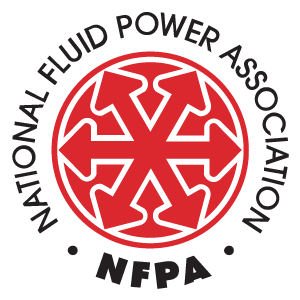
By Eric Lanke
NFPA President/CEO
At our recent Annual Conference in Laguna Beach, California, I shared the key ways NFPA is fulfilling its mission to strengthen the fluid power industry. In this, the fifth and final NFPA News post in this series, I’d like to share some of the things I said regarding NFPA’s objective to Increase the number of university students educated in fluid power, and to connect them to careers in our industry.
In our biennial membership survey, NFPA members consistently rank workforce development as the most challenging issue their companies face. The NFPA Foundation was created to help meet this need. Through its donors, it provides the resources necessary to develop fluid power education at multiple grade levels, and through its committees and connection opportunities, it brings its supporters face to face with the new talent being developed by those programs.
To create more fluid power-educated university graduates, we are building a pathway into our industry, but it is not based on student outreach, but rather faculty engagement. Truth be told, there are plenty of engineering students in our nation’s universities. The problem is not getting more kids to study engineering in college, the problem is teaching those kids fluid power when they’re in college.
So, to create more fluid power-educated university engineers, the NFPA and the NFPA Foundation have been conducting a number of research and education programs, designed to better engage academic faculty in the teaching of fluid power.
Research Programs
Those programs begin with our Technology Roadmap Committee defining the areas of pre-competitive research needed to increase fluid power’s competitive position in the marketplace.
With the last update to this Roadmap, there are seven broad areas of focus that we have communicated:
- Increasing energy efficiency
- Improving reliability
- Reducing size and weight
- Building “smart” systems
- Reducing environmental impact
- Improving energy storage
- Widening the scope of application for fast and accurate fluid power control
Our academic partners have used these needs to select and guide specific research projects in their community, getting more faculty members and promising graduate students to investigate what we have said are the pre-competitive needs of our industry.
Fluid Power Research is Growing
Thanks to the on-going efforts of the CCEFP, and to the new $5 million a year fluid power research program at the U.S. Department of Energy, the number of universities and national laboratories performing fluid power research continues to grow.
To help keep these researchers and their projects connected to our industry, our Foundation provided $10,000 research supplements to ten principal investigators this year, in order to ensure that they and their graduate students could attend and present their research at two industry-designated conferences.
It is through these activities that the NFPA Foundation is helping to build the careers of university faculty, who are and will be in a position to teach fluid power to thousands of undergraduate engineers on their campuses. Partnering with these faculty will be essential if we are to create significantly more fluid power education programs at our nation’s universities.
Fluid Power Curriculum
Right now, thanks to years of funding various teaching, laboratory, and curriculum grants, many universities have already embedded fluid power somewhere in their mechanical engineering curriculum.
The challenge lies in the way these fluid power programs are scattered at different institutions.
Some universities have embedded fluid power in their system dynamics and control course, for example, or they have a stand-alone fluid power course or lab in their curriculum, or they are using our Fluid Power Vehicle Challenge for their senior design experience. Almost no universities, however, are doing all these things.
We believe, that if we are going to educate engineering students in fluid power – if we’re going to produce university graduates who are attractive hires for the fluid power industry – then we must build a full fluid power curriculum for insertion into these and other core engineering courses.
Fluid Power Curriculum Tree
And now we’ve done exactly that. Thanks to the efforts of our University Education Committee, we’ve defined the nine fluid power competencies that our member companies are most looking for in entry-level engineers coming out of our nation’s universities.
Using these competencies as our guide, we have now sorted all the curriculum products that have been developed through our past grant programs and placed them online on a curriculum tree. This will provide university faculty who wish to add fluid power to one or more of their undergraduate engineering courses with a quick reference, not only for which competencies industry believe belong in their curriculum, but with the downloadable teaching products that will allow them to quickly and easily incorporate them.
Fluid Power Vehicle Challenge
One of those curriculum products is our Fluid Power Vehicle Challenge. This is a unique engineering design/build competition that embeds in the capstone design course at participating universities. It strives to teach the practical use of fluid power components and systems, while promoting original thinking in a competitive setting by combining two technology platforms that are not normally associated with one another—human-powered vehicles and fluid power.
Our industry donors form a support community around this program – serving as mentors, coaches, judges, and event hosts, getting a first and important opportunity to meet these students and recruit them into their organizations.
This April was our third annual Vehicle Challenge program. Each year it has grown, and this year we had 15 universities participating. The Vehicle Challenge is a great example of a program that is not just educating undergraduates in fluid power, it is bringing them into contact with fluid power companies that can and are hiring them.
Our program sponsors certainly recognize this opportunity. We would like to thank each of them:
- Parker Hannifin for providing a grant in general support of the program
- SunSource and Eaton for serving as the official parts suppliers to the student teams
- Lubetech for serving as the official fluids supplier
- Danfoss for serving as the host and sponsor of the final competition in 2017 and 2018
- IMI/Bimba for serving as host and sponsor of the final competition in 2019
These events are opportunities for other companies to get involved, because they are open to all who are Gold or Silver-level donors in our Pascal Society.
In fact, representatives from many of those companies have already participated as judges and other volunteers in the NFPA-hosted community we’ve built around the Vehicle Challenge, where they have reviewed the progress of the student teams and are screening and sourcing them as potential engineering talent for their organizations.
Fluid Power Careers Website
All of the students in the Vehicle Challenge – as well as many others impacted by the other education programs of the Foundation – are directed towards NFPA’s Fluid Power Careers Website. This increasingly useful tool is a place where students can learn more about fluid power careers. It is also a place where companies that are at least Bronze-level donors in our Pascal Society – whose funding is critical if we are to continue these outreach and education programs – can post their available positions for those students to review.
If you would like to learn more and become actively engaged with our university education programs, please contact me at elanke@nfpa.com or (414) 778-3351.
Like this post? Share it!
Recent Posts
Update to Regional Demand Estimates Report Now Available
The U.S. Fluid Power Regional Demand Estimates Report has been updated with 2023 estimates and is now available for download. This Excel-based report is prepared for NFPA by Oxford Economics and profiles the geographic distribution of fluid power products to end-use industries by state, including fluid power sales dollars, fluid power sales percentage, and number of…
Hear from an NCAT Student Engaged in NFPA Workforce Programs
We’re excited to share a new testimonial video from David Castro Lastor, a junior mechanical engineering student at North Carolina Agricultural and Technical State University and president of the university’s Fluid Power Club. In his video, David shares how participating in NFPA programs has shaped his academic and personal growth. Through his leadership in the…
New Episode of Fluid Power Forum: Advanced Modeling Techniques and Performance Comparisons of Electrohydraulic Systems
Today, our guest is Bruno Dupuis. Bruno is a Corporate Accounts Manager at Famic Technologies Inc., the company behind the development of Automation Studio™, a circuit design and simulation software for fluid power, electrical, robotics, process control and automation projects. He presented at NFPA’s Hydraulics Conference co-located at the 2024 iVT EXPO back in August.…



